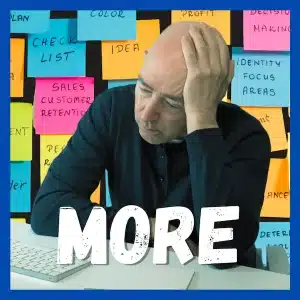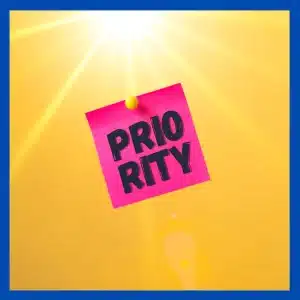This is the 4th and final post in a series on Content Saturation. Previously we discussed:
- The problem of Content Saturation
- How to Overcome Content Saturation – A Personal Consumption Guide
- How to Overcome Content Saturation – For Content Creators
Today, we tackle the big one… How to Solve Content Saturation.
Trumping Google
Whilst the digital tools of production, ie your smartphone, computer and tablet, provide the opportunity of a lifetime for you and me to create a tribe around our passion, there’s an even bigger opportunity out there just waiting to be solved.
If we think back to life PG (Pre-Google) – and this might be difficult even though it was less than 20 years ago that Brin and Page started their research at Stanford (1996) – the Internet was uncharted territory. There was no definitive phone book of what websites were available. At some point there was no search.
Whilst Google was not the first Internet Search Engine, it was one of the first to automate search results at massive scale and at lightning speed. Before this Yahoo and the like had a team of people putting websites manually into categories. This is akin to the manual switchboard operators who personally directed your phone calls. Both of these hands-on solutions are hard to imagine today.
Now, with the help of Google we can find our way around the web. At least we can search for things and find reasonable responses. And, whilst Google is the ruling overlord for finding things on the web, we need someone to trump Google to help us manage our personal content saturation problem.
The You Algorithm
If Google is ‘the web algorithm’ that sorts and finds things for us online, then what is needed is ‘the You Algorithm’ – software that searches and finds things for you and your personal preferences without even asking.
The You Algorithm could be the greatest business opportunity of the next five years.
[Tweet “The ‘Next Google’ will be the one who solves the ‘You Algorithm’ #contentsaturation”]
You might be thinking, where is this going to come from. And, you’ll be pleased to know a number of contenders are already doing this in a round-about way. Here are five examples:
1 Visa
All of your credit card transactions are tracked and sorted. And, to help detect fraud, algorithms are used to spot unlikely transactions that suggest your card details have been stolen. For instance, I had my card hacked a while back and five pairs of sporting shoes were bought from an online store in Germany. Not my usual buying pattern…
2 Target
The purpose of loyalty cards is two-fold. Firstly, it’s to entice you to become a repeat purchaser by giving you rewards based on how much you spend. Secondly, it’s to track your spending to build a personal profile of you to target (sic!) you with more personalized advertising. In Charles Duhigg’s book The Power of Habit he cites the example of Target in the US being able to determine if you are pregnant simply by noticing changes in your buying habits. And, in some cases, they knew this before you did which has proved to be a little embarrassing. This is big data at work!
3 Amazon
The whole point of tracking your purchases is to be able to provide more specific advertising to encourage your next purchase. Amazon have done this beautifully for some time. And, their suggestion ‘Customers Who Bought This Item Also Bought’ has certainly tempted me in the past.
4 Netflix Prize
Along with Amazon, one of early pioneers of recommendation engines was Netflix through their one million dollar reward for the Netflix Prize. The challenge was to develop the best ‘collaborative filtering algorithm’ to predict user ratings for films, based on previous ratings. Again, the aim was to have an educated guess about what movie you might like to view next all with the view of making choosing easier and purchases more likely.
5 Facebook
Facebook is following a similar path that has the net effect that not all your friends are treated equally. Rather than show you every single post from every single friend you have, it has an algorithm that sorts through them and simply shows the ones were there is the greatest interaction. For instance, if I like and comment on your posts often, you’ll keep showing up on my timeline. If not, I might not see your future posts.
[Tweet “Five ways you are already living in a filter bubble #contentsaturation”]
The Filter Bubble
Author Eli Pariser has termed this effect ‘The Filter Bubble’. To solve Content Saturation we need to allow software filters to screen out what we might not want to see. And the five examples above show how this is already happening.
The downside is that the filters only provide content that is consistent with what we have already viewed in the past. Therefore you will be less exposed to ideas that conflict your worldview and challenge you intellectually. In other words, you’ll live happily ever after in an information bubble designed to give you fed with the warm and fuzzy.
[Tweet “What does your #filterbubble say about you? #contentsaturation”]
In one sense this is similar to what happened in the past. Previously, the gatekeepers of the media being the editors of the TV news, magazines, book publishing and newspapers did the filtering for us. The big shift we are now seeing is that instead of a mass point of view presented by a TV network, we now have a personalized point of view presenting in our filter bubble.
Is this really the Content Saturation Solution? At one level yes it is. It means we can easily put limits on what we consume. The downside is the trade off of being exposed to new things. The great opportunity of the ‘You Algorithm’ remains for the ‘Next Google’ to resolve this in an acceptable way.




